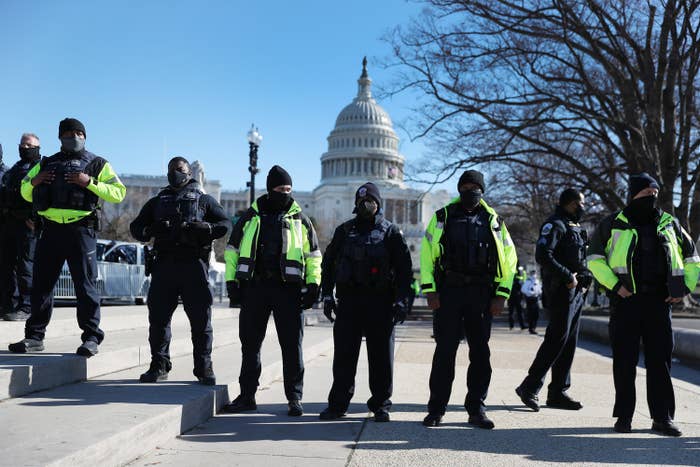DC Lawmakers Were Briefed That Trump Might Go To Extremes
Concerned the president might invoke the Insurrection Act to commandeer the city police, DC council members never expected an assault on the Capitol itself.
 |
| Members of the Metropolitan Police Department of the District of Columbia stand before the US Capitol a day after a pro-Trump mob broke into the building. |
Even as elected officials in the District of Columbia warned residents to stay home and avoid potentially violent skirmishes with pro-Trump protesters early last week, behind the scenes they were increasingly focused on what, at the time, they considered a far bigger threat: the president himself.
In a closed briefing to the 13-member City Council last Monday, the DC Attorney General’s office shared a two-page memo analyzing the risk that Trump could invoke the Insurrection Act to seize control of the city’s Metropolitan Police Department, according to three members in attendance. The 214-year-old law authorizes the president to deploy any of the country’s state or federal armed forces to suppress civil disobedience or an uprising.
The legal memo, “Potential Paths of Federal Incursion Into District Law Enforcement,” focused on whether the Insurrection Act would allow Trump to take control of the MPD. The document, the existence of which has not previously been reported, also contemplated the possibility of the White House using the National Guard and federal law enforcement agencies such as the US Marshals Service and the Bureau of Prisons to effectively take control of the city.
“We had every reason to suspect there would be some sort of trouble,” said Phil Mendelson, chair of the city council. But he added that “our concern was that it would be fomented by the president who would say: ‘Look, there’s rioting and chaos — we need to take over the police department and bring in the National Guard.’”
The issues raised in the memo spotlight the significant role that deep mistrust of the Trump administration within DC’s government may have played as it prepared for what would prove a critical moment in the nation’s history. With thousands of violent Trump supporters flooding into the city, it was primarily the threat to order posed by a volatile president, rather than his extremist supporters, that raised concerns of the city council.
The DC Attorney General’s office confirmed to BuzzFeed News that the briefing took place and a memo had been prepared but did not provide further comment. The mayor’s office did not immediately respond to questions about whether this consideration affected how the city prepared for the events of Jan. 6.
City officials have jurisdiction over the Metropolitan Police Department, but although the Capitol and other federal buildings are located within the District of Columbia, they are policed by their own agencies. The US Capitol Police, which answers to Congress, is solely responsible for guarding the Capitol. It wasn’t until after the Capitol Police had been overwhelmed that it asked the MPD to assist, which it did, helping clear the Capitol grounds and arresting scores of people in the hours after the building was cleared.
Trump ultimately did not invoke the Insurrection Act last week; instead he stoked election conspiracy theories in a fiery Wednesday morning speech that encouraged his crowd of supporters to head to the Capitol and “fight like hell.” Within hours of his speech, a violent mob had bludgeoned and pepper-sprayed its way past police lines and into the Capitol building, where members of Congress, staffers, and media cowered in fear. Five people, including one Capitol Police officer, died in the melee.
DC Councilmember Brooke Pinto said that even before Wednesday, she and others in the city’s leadership saw Trump as an increasingly unstable leader who might act unpredictably on the day of the protests, but an all-out assault on one of the nation’s most hallowed buildings was far from everyone’s mind. Instead, she said, the concern was about potential mayhem that the city’s own police force could wreak if taken over by Trump.
“We have to ensure that we're prepared to protect our residents in the event that President Trump goes too far,” said Pinto about the discussions among some council members, adding that the president had shown repeatedly he didn’t respect the rule of law or democracy.
DC officials said their concerns that Trump might commandeer local law enforcement were based on the White House raising that scenario last year, at the height of a very different protest movement.
Last summer, when protests over the killing of George Floyd engulfed the nation, Justice Department officials met with DC Attorney General Karl Racine and the city’s police chief to discuss the possibility of Trump taking over the MPD, Mendelson said. Federal officials ultimately backed off on their threat to use the Insurrection Act when Racine said he was prepared to go to court to block the action, Mendelson recalled.
Trump had publicly discussed employing the military to curtail civil dissent around that time as well, underscoring the anxieties of DC’s elected officials.
"If a city or state refuses to take the actions that are necessary to defend the life and property of their residents, then I will deploy the United States military and quickly solve the problem for them," Trump said in a statement from the Rose Garden on June 1, just a week after Floyd was killed in Minneapolis.
As Trump was speaking, federal police forcefully cleared protesters from Lafayette Square using tear gas and batons, making way for the president to walk across the street to St. John’s Church, where he posed for a photo holding a Bible. The event became a very public debacle and an embarrassment to DC officials, who felt they’d lost control of their own city at the hands of police controlled by the White House

Comments
Post a Comment